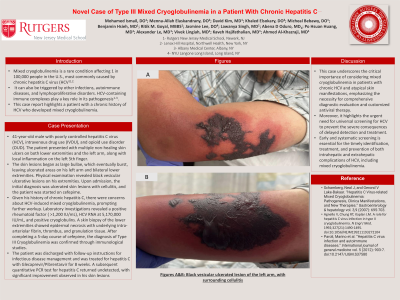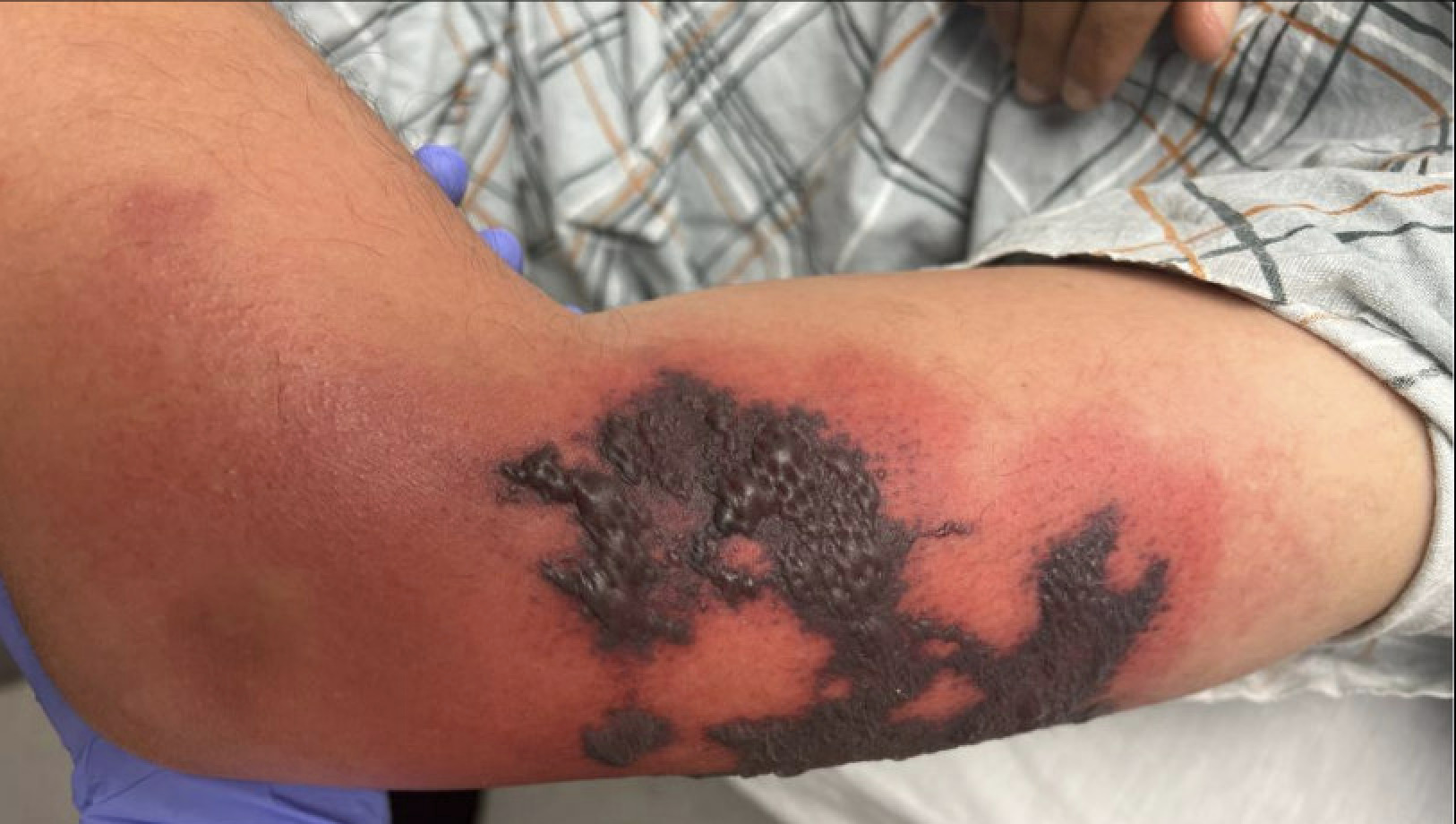Tuesday Poster Session
Category: Liver
P4726 - A Novel Case of Type III Mixed Cryoglobulinemia in a Patient With Chronic Hepatitis C
Tuesday, October 29, 2024
10:30 AM - 4:00 PM ET
Location: Exhibit Hall E

Has Audio
- MI
Mohamed Ismail, DO
Rutgers New Jersey Medical School, NJ
Presenting Author(s)
Mohamed Ismail, DO1, Menna-Allah Elaskandrany, DO2, David Kim, MD1, Khaled Elsokary, DO3, Micheal Bebawy, DO1, Benjamin Hsieh, MD1, Ritik M. Goyal, MBBS1, Jasmine Lee, DO4, Lawanya Singh, MD1, Abena D Oduro, MD1, Po Hsuan Huang, MD1, Alexander Le, MD1, Vivek Lingiah, MD1, Kaveh Hajifathalian, MD1, Ahmed Al-Khazraji, MD1
1Rutgers New Jersey Medical School, Newark, NJ; 2Lenox Hill Hospital, Northwell Health, Astoria, NY; 3Albany Medical Center, Albany, NY; 4NYU Langone Health, New York, NY
Introduction: Mixed cryoglobulinemia is a rare condition affecting 1 in 100,000 people in the U.S., most commonly caused by chronic hepatitis C virus (HCV). It can also be triggered by other infections, autoimmune diseases, and lymphoproliferative disorders. HCV-containing immune complexes play a key role in its pathogenesis. This case report highlights a patient with a chronic history of HCV who developed mixed cryoglobulinemia.
Case Description/Methods: We present a novel case of a 41-year-old male with poorly controlled hepatitis C virus (HCV), intravenous drug use (IVDU), and opioid use disorder (OUD). The patient presented with multiple non-healing skin ulcers on both lower extremities and the left arm, along with local inflammation on the left 5th finger. The skin lesions began as large bullae, which eventually burst, leaving ulcerated areas on his left arm and bilateral lower extremities. Physical examination revealed black vesicular ulcerative lesions on his extremities. Upon admission, the initial diagnosis was ulcerated skin lesions with cellulitis, and the patient was started on cefepime. Given his history of chronic hepatitis C, there were concerns about HCV-induced mixed cryoglobulinemia, prompting further workup. Laboratory investigations revealed a positive rheumatoid factor ( >1,200 IU/mL), HCV RNA at 5,170,000 IU/mL, and positive cryoglobulins. A skin biopsy of the lower extremities showed epidermal necrosis with underlying intra-arteriolar fibrin, thrombus, and granulation tissue. After completing a 5-day course of cefepime, the diagnosis of Type III Cryoglobulinemia was confirmed through immunological studies. The patient was discharged with follow-up instructions for infectious disease management and was treated for hepatitis C with Glecaprevir/Pibrentasvir for 8 weeks. A subsequent quantitative PCR test for hepatitis C returned undetected, with significant improvement observed in his skin lesions.
Discussion: This case underscores the critical importance of considering mixed cryoglobulinemia in patients with chronic HCV and atypical skin manifestations, emphasizing the necessity for comprehensive diagnostic evaluation and customized antiviral therapy. Moreover, it highlights the urgent need for universal screening for HCV to prevent the severe consequences of delayed detection and treatment. Early and systematic screening is essential for the timely identification, treatment, and prevention of both intrahepatic and extrahepatic complications of HCV, including mixed cryoglobulinemia.

Disclosures:
Mohamed Ismail, DO1, Menna-Allah Elaskandrany, DO2, David Kim, MD1, Khaled Elsokary, DO3, Micheal Bebawy, DO1, Benjamin Hsieh, MD1, Ritik M. Goyal, MBBS1, Jasmine Lee, DO4, Lawanya Singh, MD1, Abena D Oduro, MD1, Po Hsuan Huang, MD1, Alexander Le, MD1, Vivek Lingiah, MD1, Kaveh Hajifathalian, MD1, Ahmed Al-Khazraji, MD1. P4726 - A Novel Case of Type III Mixed Cryoglobulinemia in a Patient With Chronic Hepatitis C, ACG 2024 Annual Scientific Meeting Abstracts. Philadelphia, PA: American College of Gastroenterology.
1Rutgers New Jersey Medical School, Newark, NJ; 2Lenox Hill Hospital, Northwell Health, Astoria, NY; 3Albany Medical Center, Albany, NY; 4NYU Langone Health, New York, NY
Introduction: Mixed cryoglobulinemia is a rare condition affecting 1 in 100,000 people in the U.S., most commonly caused by chronic hepatitis C virus (HCV). It can also be triggered by other infections, autoimmune diseases, and lymphoproliferative disorders. HCV-containing immune complexes play a key role in its pathogenesis. This case report highlights a patient with a chronic history of HCV who developed mixed cryoglobulinemia.
Case Description/Methods: We present a novel case of a 41-year-old male with poorly controlled hepatitis C virus (HCV), intravenous drug use (IVDU), and opioid use disorder (OUD). The patient presented with multiple non-healing skin ulcers on both lower extremities and the left arm, along with local inflammation on the left 5th finger. The skin lesions began as large bullae, which eventually burst, leaving ulcerated areas on his left arm and bilateral lower extremities. Physical examination revealed black vesicular ulcerative lesions on his extremities. Upon admission, the initial diagnosis was ulcerated skin lesions with cellulitis, and the patient was started on cefepime. Given his history of chronic hepatitis C, there were concerns about HCV-induced mixed cryoglobulinemia, prompting further workup. Laboratory investigations revealed a positive rheumatoid factor ( >1,200 IU/mL), HCV RNA at 5,170,000 IU/mL, and positive cryoglobulins. A skin biopsy of the lower extremities showed epidermal necrosis with underlying intra-arteriolar fibrin, thrombus, and granulation tissue. After completing a 5-day course of cefepime, the diagnosis of Type III Cryoglobulinemia was confirmed through immunological studies. The patient was discharged with follow-up instructions for infectious disease management and was treated for hepatitis C with Glecaprevir/Pibrentasvir for 8 weeks. A subsequent quantitative PCR test for hepatitis C returned undetected, with significant improvement observed in his skin lesions.
Discussion: This case underscores the critical importance of considering mixed cryoglobulinemia in patients with chronic HCV and atypical skin manifestations, emphasizing the necessity for comprehensive diagnostic evaluation and customized antiviral therapy. Moreover, it highlights the urgent need for universal screening for HCV to prevent the severe consequences of delayed detection and treatment. Early and systematic screening is essential for the timely identification, treatment, and prevention of both intrahepatic and extrahepatic complications of HCV, including mixed cryoglobulinemia.

Figure: Black vesicular ulcerated lesion of the left arm, with surrounding cellulitis
Disclosures:
Mohamed Ismail indicated no relevant financial relationships.
Menna-Allah Elaskandrany indicated no relevant financial relationships.
David Kim indicated no relevant financial relationships.
Khaled Elsokary indicated no relevant financial relationships.
Micheal Bebawy indicated no relevant financial relationships.
Benjamin Hsieh indicated no relevant financial relationships.
Ritik Goyal indicated no relevant financial relationships.
Jasmine Lee indicated no relevant financial relationships.
Lawanya Singh indicated no relevant financial relationships.
Abena D Oduro indicated no relevant financial relationships.
Po Hsuan Huang indicated no relevant financial relationships.
Alexander Le indicated no relevant financial relationships.
Vivek Lingiah indicated no relevant financial relationships.
Kaveh Hajifathalian indicated no relevant financial relationships.
Ahmed Al-Khazraji indicated no relevant financial relationships.
Mohamed Ismail, DO1, Menna-Allah Elaskandrany, DO2, David Kim, MD1, Khaled Elsokary, DO3, Micheal Bebawy, DO1, Benjamin Hsieh, MD1, Ritik M. Goyal, MBBS1, Jasmine Lee, DO4, Lawanya Singh, MD1, Abena D Oduro, MD1, Po Hsuan Huang, MD1, Alexander Le, MD1, Vivek Lingiah, MD1, Kaveh Hajifathalian, MD1, Ahmed Al-Khazraji, MD1. P4726 - A Novel Case of Type III Mixed Cryoglobulinemia in a Patient With Chronic Hepatitis C, ACG 2024 Annual Scientific Meeting Abstracts. Philadelphia, PA: American College of Gastroenterology.
